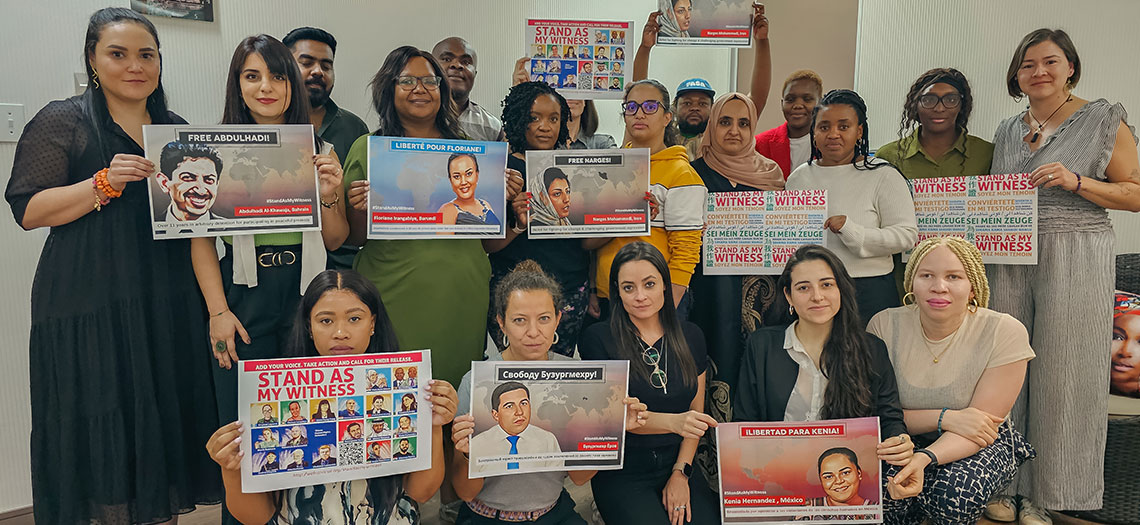Table of Contents
Institutional Strengthening
People, accountability and learning
The CIVICUS secretariat is a diverse team of over 80 people spread across more than 30 countries, so developing a shared understanding of our values and enhancing cross-functional collaboration is key. Over the past year, our human resources initiatives have steered the organisation towards an improved leadership culture and integrated programme and operational practices, bridging gaps between internal forums to foster a cohesive leadership environment.
We refined our internal processes through feedback mechanisms such as exit interviews, focus groups and surveys, and developed a Unified Code of Ethics, which is now in its feedback and socialisation phase to ensure everyone is aware of and adheres to the enhanced ethical standards.
Between November 2023 and January 2024, we addressed challenges arising from complaints received through social media and anonymous whistleblowing channels. Following a rigorous investigation that found these allegations were unfounded, our focus shifted to strengthening trust and transparency in our complaints and grievance procedures.
Our Learning and Development Framework helped us deliver on our strategic objectives effectively. It incorporated leadership best practices that promoted a unified organisational identity, including by establishing a Collective Management Forum in response to assessments that identified the need to address siloed working practices. Secretariat leaders also collected input through surveys and engaged staff through open space sessions and discussions to respond to staff needs.
In fulfilling our commitment to racial equity, we increased the number of Black Africans and people of colour among our line managers. Now 69 per cent of our line managers come from these groups, a significant improvement from 2021, when the figure was 50 per cent. As part of our partnership with Democracy International, we provided fully funded training and development opportunities in Germany to two South African graduates.
Our updated performance management system has driven improved ownership and accountability across the organisation. New probation templates introduced in October 2023 have been used by 25 staff members, resulting in a more structured, efficient and accountable process to integrate new staff and increased staff ownership of their probationary journeys.
We are incorporating lessons from new programmes such as DDI and LLL into a refreshed innovation and quality model to ensure lessons are systematically applied across the organisation, and we continue to refine our Integrated Results Framework by incorporating new standardised project monitoring, evaluation and learning requirements to measure collective contributions to change.
We conducted user experience research on financial partnerships to improve consistency, accessibility and efficiency, and made progress on financial management and donor engagement, supported by a systems review led by the Denmark Ministry of Foreign Affairs. In May 2024, over 20 staff members attended a workshop at our headquarters in Johannesburg to understand the complexities of EU-funded projects and facilitate collaboration between teams.

Member growth and engagement
Our membership continues to grow, reflecting the growing recognition of CIVICUS as a key source of solidarity and support and a leading voice in the global civil society community. We now have over 15,000 members in 189 countries. They represent a diverse range of CSOs, activists and allies committed to protecting, defending and expanding civic and democratic space. Our alliance includes two network groups, the Affinity Group of National Associations (AGNA) and the Youth Network, led by the YAT. It also includes CIVICUS-led coalitions such as Vuka! and networks initially incubated by CIVICUS and now independent, such as CHARM and the Innovation for Change (I4C) global hubs.
CIVICUS has a 12-member board, elected by the membership to provide strategic direction. It is currently led by Dylan Mathews as Chair and Sonia Kwami as Vice-Chair. Five board members were elected in 2023 and began a three-year term in January 2024, including new members Blessing Ewa, Paulina Ibarra and Yi Kang Choo.
Ahead of the transition of Lysa John, who as Secretary General presided over a period of immense growth in all aspects of CIVICUS’s work, the board met in person in June 2023 to determine an appropriate approach to ensure stability and continuity. While the Board Search Committee leads the recruitment of the next CIVICUS Secretary General, it was decided to adopt an interim arrangement with Chief Operations Officer, Claire Nylander, and Chief Officer for Evidence and Engagement, Mandeep Tiwana, working together as co-leaders from October 2024 to June 2025.
Over the past year, we continued to engage with our members through our regular communication channels, which include our newsletters, social media accounts and website. As part of our 2022-2027 strategy to reimagine engagement, we started a Membership Engagement Month, held annually from 10 November to 10 December with the expectation that it will help create spaces for knowledge sharing, provide a clearer understanding of strategic processes and enhance accountability. Key events in its 2023 edition included the CIVICUS board meeting, several regional membership meetings, the CIVICUS Members’ General Assembly, the global launch of the CIVICUS Monitor annual report and the 16 Days of Action campaign to end violence against women.
We also continued to convene civil society meetings and provide networking opportunities for our members, including through projects such as CHARM and the WeRise! campaign.
One of our key meetings during this period was held in Latvia to launch an EU-funded multi-year programme to strengthen member-led networks.
Hosted by AGNA members Civic Alliance – Latvia and the Latvian Platform for Development Cooperation, the meeting brought together 36 members from over 25 countries, representing four networks: AGNA, I4C, the Vuka! Coalition and the YAT. Participants worked in mixed groups to explore synergies between networks, define network priorities, brainstorm joint projects and chart a way forward. Sessions also covered practical aspects of grant management, including sub-granting, procurement and monitoring. A plenary session with the Latvian ambassador to the UN addressed global conflicts, human rights issues and civic space restrictions. The meeting concluded with individual strategy sessions for the four networks to refine their approaches to increasing the impact of the ‘Strengthening the CIVICUS Alliance’ action grant.
Our alliance
